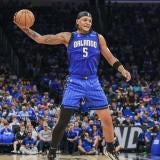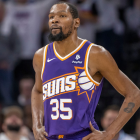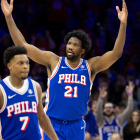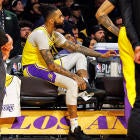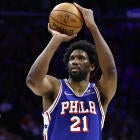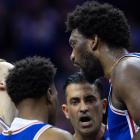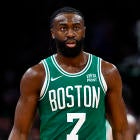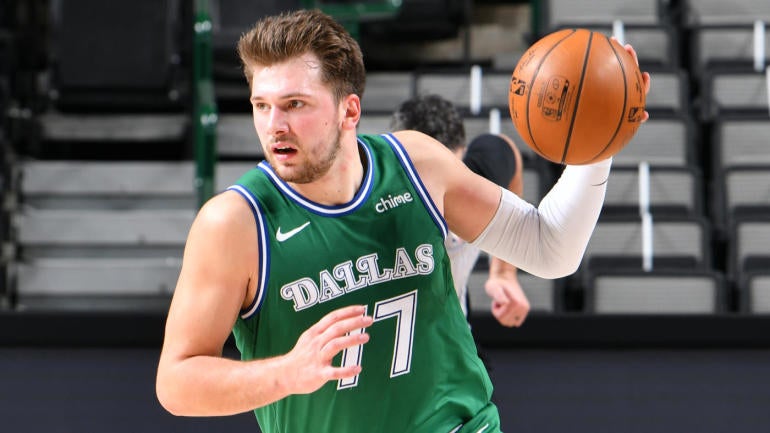
Behold, the following statistics from the first-round series between the Dallas Mavericks and Los Angeles Clippers:
- Luka Doncic played 284 minutes in the series. The Mavericks won those minutes by seven points. The Mavericks played 52 minutes without him in the series. They were outscored by 43 points in those minutes.
- The Mavericks made 274 field goals in the series. Doncic scored or assisted on 161 of them, meaning he directly created 58.6 percent of their baskets. Kawhi Leonard, by contrast, scored or assisted on 114 of the Clippers' 273 field goals, or around 41.8 percent.
- Doncic scored or assisted on 77 points in Game 7 alone. That's an NBA record, according to the Elias Sports Bureau.
Doncic almost singlehandedly knocked one of the championship favorites out of the playoffs in the first round, and this wasn't even the first time that happened. He pushed the Clippers to six games in the Orlando bubble last season under very similar circumstances. Twice, he has gone mano-a-mano with two-time Finals MVP Kawhi Leonard and twice, he has statistically outplayed him in losing efforts because, unlike Leonard, who has Paul George, Doncic has no co-star to share the load.
That showed throughout the series, but especially in Game 7. Doncic scored 29 points in a transcendent first half, but in the first 18 minutes of the second half, he scored only six more. Some of that came down to the aggressive defense played by the Clippers, but some of it was undeniably exhaustion. His scoring dropped with each quarter in this series as a whole.
| Quarter | Points per quarter | Field goal percentage |
|---|---|---|
1 | 12.1 | 54.2 |
2 | 10.1 | 61.9 |
3 | 7.7 | 44.2 |
4 | 5.7 | 34.9 |
The Mavericks traded for Kristaps Porzingis hoping he could ease Doncic's scoring burden. He averaged only 13 points per game in this series. Some of that was by design. Dallas has largely used Porzingis as a stationary shooter this season, which does have intangible benefits for Doncic. It theoretically pulls opposing big men away from the basket, which makes it easier for him to score at the rim. But the Clippers eschewed big men almost entirely midway through this series, and Porzingis, who is 7-3, couldn't punish them for it. Even if the Dallas coaching staff should have used him more creatively after the Clippers shifted small, the burden ultimately should fall on Porzingis for failing to assert himself in this series or in this season as a whole. Considering his health (which we'll call precarious) and his contract (which we'll call potentially disastrous), Porzingis has not only failed to give Doncic that sorely needed sidekick thus far, but is actively standing in the way of the Mavericks finding that sort of player.
So what can Dallas do about this? How can they find a true sidekick for their generational superstar, and how long will it take? Let's take a look at their assets, their cap situation and their timeline to try to figure out when Doncic will finally get the help he needs.
Trade assets
Considering Luka's rising star, the possibility of a superstar actively forcing his way to Dallas and only Dallas can't be ruled out. If that's the case, the actual value of their assets doesn't particularly matter. However, if the Mavericks have to trade for a star fair and square, they're not exactly starting on the inside track.
The Mavericks currently owe two first-round picks to the Knicks. The first is the No. 21 overall pick in this July's draft, but more importantly, the second is a 2023 first-rounder with top-10 protections. This matters for two reasons, and they both relate to the pesky Stepien Rule. That bylaw dictates that teams must not be without first-round picks in consecutive seasons. Because the Mavericks owe their 2023 pick to the Knicks, they can't trade their 2022 pick unless they acquire another one in either 2022 or 2023 first. That would leave them without first-round picks in consecutive drafts.
More pressingly, that top-10 protection extends out through 2025. In all likelihood, the Mavericks won't be picking in the top 10 in 2023 and therefore will send their pick to the Knicks then. However, the Stepien Rule does not consider likelihood. The mere fact that a scenario exists in which the Mavericks wouldn't have picks in 2024 or 2025 means that they cannot trade their first-round picks in 2024 or 2025, or, for that matter, 2026, because if they lose their pick in 2025, dealing the 2026 pick would leave them without first-rounders in consecutive drafts. Therefore, at this moment, they can trade only one first-round pick: their first-rounder in either 2027, or, once the 2021 draft passes, 2028. There is a workaround here, but it's a risky one. The Mavericks can remove the protections they placed on that 2023 pick, but only if the Knicks agree. The Bucks needed to do this when they traded for Jrue Holiday last offseason, and the Cavaliers demanded a second-round pick as compensation, so Dallas would likely have to pay New York a similar price to unlock its picks. If it went this route, it could put together a relatively interesting package of picks for a star trade: unprotected choices in 2025 and 2027 along with swap rights in 2022, 2024, 2026 and 2028.
Brooklyn went a similar route in acquiring James Harden. Here's the difference: Kevin Durant and James Harden are both 32 years old. Houston wanted their picks deep into the future because eventually, those guys are going to age out of superstardom and the Nets will presumably struggle to replace them without their picks. But in 2028, Doncic will only be 29. The picks that the Mavericks could therefore offer just aren't as valuable. How bad can a team with Luka really be?
Not bad enough to be in the lottery, as this year's group proved. If Dallas had any players who were especially tradable right now, they likely would have been good enough to beat the Clippers, but in truth, none of their younger players hold too much appeal on the trade market. Tim Hardaway Jr. was probably their second-best player this season, but he's about to get a big contract in free agency. Jalen Brunson is an interesting prospect at 24, but he's only one year away from being paid his market rate as well. Their 2020 draft picks, Tyrell Terry and Josh Green, are interesting second-draft candidates, but neither would be likely to net the picks it cost to take them a year ago in a trade. Some contender might give up a late first-round pick for Maxi Kleber.
But realistically, there just isn't enough here to trade fair value for a superstar. If the Mavericks were going to have to trade for someone, they'd likely have to do what they did to get Porzingis: accept distressed assets. If there was a star out there with a particularly serious injury problem, Dallas might be able to afford that player, or if a team was desperate to shed onerous contracts as the Knicks were, Dallas could accommodate. But given how poorly the Porzingis trade went, would the Mavericks really want to go down this path again? Probably not. More likely, their path to a co-star probably lies through free agency.
Cap situation
Dallas has spent the past two seasons planning specifically for the summer of 2021. The plan, ideally, was to lure Giannis Antetokounmpo away from the Bucks to create a trio of international superstars. But Antetokounmpo re-signed. So did LeBron James, Paul George and Rudy Gobert. The vaunted 2021 class has only a single in-his-prime superstar left, and he's unlikely to join the Mavericks after what just happened: Kawhi Leonard.
Dallas might not have an obvious target for it, but they still have quite a bit of cap flexibility this offseason. Assuming Josh Richardson opts into the final year of his deal, but Willie Cauley-Stein's team option is declined, Dallas will owe roughly $87 million in salary to 10 players. Against a projected $112.4 million cap, that isn't quite max space, but it's close enough to make a splash, and if Dallas needed to get to the max, there are simple ways to go about it. Richardson opting out would essentially get them there. Finding trade takers for Richardson, Kleber or Dwight Powell would be simple enough with a second-round pick attached as well If worst came to worst, the Mavericks could use the stretch provision on one of them. That would allow them to pay out the total amount owed to that player over twice the number of years left on their contract, plus one. This is usually a last resort, though, because it bogs down cap sheets well into the future. The Miami Heat are dealing with this now. They owe more than $5 million to Ryan Anderson, and that is what is keeping them from something close to true max space.
It should be noted, though, that if the Mavericks choose to create cap space this offseason, it would mean letting go of their own free agents. Most notably, it would mean renouncing their rights to Hardaway, who Dallas would likely prefer to re-sign. In theory, they could still do so and create cap space by trading other veterans, but regardless, there is a price attached to generating space. Dallas won't be able to do so without sacrificing some of its own players.
Things get significantly more complicated after the 2021 offseason, though, because Doncic officially becomes extension-eligible when free agency begins. Barring something extremely unforeseen, the Mavericks are going to offer him a max deal. That deal won't apply to the 2021-22 season, when Doncic will only make around $10.2 million, but it will kick in thereafter, and it will be very, very expensive. Normally, players with four years of experience can earn only 25 percent of the cap in the first year of their rookie extension. However, the NBA makes an exception for truly special players through the Derrick Rose Rule. If a player makes an All-NBA team, wins Defensive Player of the Year or wins MVP in the season before the deal kicks in, or in two of the previous three seasons, that player is eligible to earn 30 percent of the cap in the first year of their deal. Doncic made an All-NBA Team last season, so assuming he does again this season, he will be eligible for a Rose Rule max. The projected cap for the 2022-23 season is roughly $115.8 million, so Doncic's new deal would start at around $34.7 million. It would rise by eight percent annually after that.
Porzingis, assuming he opts into the final season of his deal, will make roughly $100 million over the last three years of his deal. With two max players on their books, it will be almost impossible for the Mavericks to clear max cap space in the summers of 2022 or 2023. If they do, it will be because the cap not only grew favorably in that time but because they managed to offload basically all of their role players. The Mavericks have typically avoided that approach. Last offseason, they signed Trey Burke to a multi-year deal and took on Richardson's option before knowing what Antetokounmpo would do. The point is: Dallas has cap space for now, but it won't forever. So how can they make use of that space, or find ways to preserve enough of it to be players down the line? Let's look at their options over the next four offseasons.
2021 offseason
There aren't Giannis-caliber free agents still available in 2021, but there are perfectly suitable sidekicks available if the Mavericks are willing to overlook age and injury concerns. The following four players stand out as possibilities:
- Chris Paul: Phoenix's point guard has a player option for next season at $44.2 million, but is expected to opt out and seek a longer-term deal after a very successful debut season with the Suns. If he does, his per-year salary would likely decline to account for his age, but he could guarantee himself more money overall. His first choice would likely be to re-sign with Phoenix, but if he explored his options in earnest, joining a superstar such as Doncic would likely appeal to him as he seeks his first championship ring. The issue with signing Paul is that he's already 36. Aside from basketball concerns, the NBA's rarely-used Over-38 rule would also come in to play if Dallas (or Phoenix, or anyone else) was to offer him a four-year deal. In that case, any money earmarked for seasons after his 38th birthday would count against the cap in earlier seasons as deferred compensation. That's far easier for a team with Bird Rights to account for than one with a limited amount of cap space, but it's all moot if Paul is willing to accept three or fewer seasons. At his age, that seems likely.
- Mike Conley: Like Paul, Conley's age will surely impact his next deal, but he played at an All-Star level this season and has, for the most part, been quite durable throughout his career. His preference would likely be a new deal with the Jazz, and Utah will surely try to accommodate him. But Conley met with the Mavericks when he was last a free agent in 2016, and Utah is already close to the projected luxury tax next season. Re-signing Conley would give them one of the most expensive rosters in NBA history. Maybe they're willing to pay up for that kind of roster and maybe they aren't. If it's the latter, Dallas could swoop in and steal Conley as their point guard for the next few years.
- Kyle Lowry: The Raptors could have traded Lowry at the deadline. They chose not to, and it's unclear what led to that decision. Perhaps they wanted to keep the option of re-signing Lowry themselves. If so, their Bird Rights would allow them to outbid suitors like Dallas. If they were simply unsatisfied with the offers, Dallas would be bidding against Miami, New York and, potentially, through a sign-and-trade, Philadelphia. The Knicks can offer the most money. The Heat have his close friend Jimmy Butler. The 76ers are his hometown team. That makes Dallas an unlikely destination for Lowry, but not an impossible one.
- DeMar DeRozan: Here's the likeliest big-name 2021 addition. San Antonio could certainly afford to re-sign DeRozan, but they have so many young guards that it would make little sense to do so. Even if it did, reports have suggested that DeRozan has been interested in a change of scenery for years. Other teams would be scared off by DeRozan's limitations as a 3-point shooter, but Dallas, with Porzingis and a plethora of other shooters, can afford to devote big money to a mid-range gunner. He wouldn't help their defense, but adding him to the Dallas offense would help so much that, for the time being, that might not matter to the Mavericks.
Do the Mavericks want to add an older co-star? Conventional wisdom says no. Dallas would certainly prefer someone on Doncic's timeline, as they did with Porzingis. But remember, Doncic is only 22. He might not even be in his prime by the time whoever they sign in 2021 leaves Dallas. This doesn't need to be the last roster makeover of the Doncic era. But more on that later. For now, let's set our sights ahead a few years.
2022 and 2023 offseasons
True superstars will return to the free-agent market in 2022 and 2023. Here's an incomplete list of who could be available each offseason:
2022: Kevin Durant, Stephen Curry, James Harden, Bradley Beal, Zach LaVine, Jimmy Butler, Kyrie Irving, Julius Randle, Russell Westbrook
2023: LeBron James, Joel Embiid, Nikola Jokic, Khris Middleton, Nikola Vucevic, Draymond Green, Christian Wood
Now, let's be absolutely clear: not all of those players are actually going to be available. Some of them are going to re-sign before free agency, as many of the 2021 stars did. The point is that some of them will explore free agency, and if their goal is to compete for championships, they will surely give whatever team Doncic plays for a long look.
The problem, as we've discussed, is that Doncic will be making the max by then. Porzingis already is. With both of them on the books, Dallas will have a hard time creating the cap space to chase any of these stars. They could try to do so through a sign-and-trade, but aside from the asset concerns we've already covered, doing so would hard-cap the Mavericks at the apron. That would be a very, very difficult situation for a team with three max players to handle. It would essentially prevent the Mavericks from keeping or building any depth for a year. For now, we'll say that option is unlikely. If the Mavericks are going to chase any of these stars, they're going to have to create the cap space to do so. That will mean trading Porzingis.
But who would take on that contract after the season he just had? The honest answer might be nobody. But Porzingis was once viewed as a star. Some team desperate for a talent upgrade will at least consider swapping one of their own bad contracts for him. Here are a couple of ideas:
- Porzingis for Kemba Walker. Dallas was reportedly interested in Walker as a 2019 free agent. He chose Boston. Now he's starting to decline before their very eyes, and with Jaylen Brown and Jayson Tatum now on market-value contracts, they won't have the cap space to sign a replacement. Porzingis is significantly younger and fits their timeline, but his contract lasts a year longer than Walker's. That would essentially be the premise of the swap. Dallas gets max cap space a year early. Boston turns an injury-plagued 31-year-old into an injury-plagued 25-year-old.
- Porzingis for Andrew Wiggins. If any power forward could protect Porzingis defensively, it would be Draymond Green. Think of the spacing in lineups featuring Porzingis, Stephen Curry and Klay Thompson. Most importantly, it's a chance for Golden State to take an upside swing without sacrificing its most valuable assets. They could keep James Wiseman and their picks while potentially adding to the young core while taking a swing to improve their current roster, essentially having their cake and eating it, too. Wiggins' contract, like Walker's, expires one year before Porzingis'. His defense would help the Mavericks.
- Porzingis for John Wall. Wall showed flashes this season but is not nearly the same player he was in his prime. Perhaps Doncic could reinvigorate him. Houston is in the middle of a rebuild, so would likely be intrigued by the chance to swap Wall for the younger Porzingis. Doing so would also create more minutes for their young guards, and possibly, a 2021 lottery pick (Cade Cunningham, in a perfect world). Wall's deal, like the others mentioned, expires a year before Porzingis'.
- Porzingis for Kevin Love. Same logic as above. Rebuilding team gets younger. Mavericks shave a year off of the Porzingis deal. This trade has the added benefit of getting Love, who seems to want to contend again, onto a better team.
- Porzingis for Steven Adams. The Pelicans just gave up a first-round pick for Adams, so this one is unlikely, but hey, if they want a shooting big man to pair with Zion Williamson, there's some logic to this.
Finding a deal for a player who expires in 2022 is substantially harder, both because there are fewer big contracts that happen to end then and because it would take more value from Dallas to make it worth that team's while. One possible option might be a deal centered around Al Horford, who is guaranteed only $14.5 million for the 2022-23 season. For enough draft picks, the Thunder appear willing to take on almost anyone.
That might be the key to dumping Porzingis early. Dallas might not have the picks to trade for a superstar, but if they went to a team with cap space or an expiring contract and offered some package including multiple first-round choices or swaps, they might be able to find a taker.
Of course, the Mavericks probably wouldn't want to give up all of those picks without knowing a star is coming. More likely, they'd secure a commitment from a star free agent and then offer teams with cap space multiple draft picks to take on Porzingis down the line. At that point, his deal would be shorter anyway.
But there is another path here. Dallas could wait until Porzingis expires entirely. The summer of 2024 might be their best moment to strike for several reasons.
2024 offseason
The 2024 free-agent class includes four players currently age 25 or younger that have already been named All-Stars: Devin Booker, Karl-Anthony Towns, Jaylen Brown and Domantas Sabonis. Pascal Siakam falls outside of that age range, but he'll be available as well. So will older players like CJ McCollum and Gordon Hayward, while Paul George and Jrue Holiday have player options. In other words, this is the perfect offseason to have a 25-year-old MVP candidate and mountains of cap space. Some of those players are staying put. Some of them will grow frustrated after years of postseason disappointments. The ones that do will find a welcome alternative in Dallas playing alongside Doncic.
And the best part? Dallas doesn't have to do anything to create the space to chase those players. The Mavericks don't currently have a penny committed to a single player for the 2024-25 offseason. Doncic will change that shortly, but beyond him, the Mavericks could theoretically keep their books clean and pursue multiple stars that offseason.
Of course, doing so would require some patience. After all, Dallas wouldn't want to waste three potentially transcendent Doncic years waiting for this bonanza, would they? Well, here's where we circle back to the 2021 offseason. They wouldn't have to wait. They'd just to have to use their cap space now to sign players to three-year deals and plan not to sign anyone aside from Doncic for deals longer than that.
For example: say Dallas carves out enough space to sign DeRozan without losing Hardaway. They could sign both to three-year pacts. DeRozan, who turns 32 this offseason, won't get a longer offer. The other older guards available in 2021 are in the same position. From there, they'd assume that Doncic, Porzingis, Hardaway and DeRozan would be their core for the next three seasons, and would simply rely on short-term deals to support them with defenders. And then, after three years, they'd let everyone but Doncic walk and completely reshape the team in free agency.
If Dallas has another path to a true, in-his-prime superstar right now, sure, they should take it. But under the more realistic scenario in which they have to lure someone in free agency, this 2021-to-2024 approach is their best chance at giving Doncic a competitive roster right now while also maintaining the flexibility to sign a true superstar or two alongside him down the line.
True superstars are going to want to play with Doncic. They saw what he could do on his own against the Clippers, and will surely realize that uniting with him would create a realistic path to championships. Those stars just don't happen to be available yet. If the Mavericks can't get one right now, they can at least improve their immediate prospects while positioning themselves to do so later.









